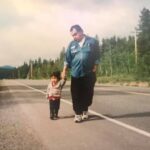The Vancouver International Film Festival wraps up next week and a Haisla-focussed film set in Kitamaat is already being celebrated as one of the highlights.
Writing in Hollywood North Magazine, critic Shaun Lang called Monkey Beach “one of the shiniest jewels in the recent wave of Canadian Indigenous Cinema. If The Grizzlies was the Inuit answer to the sports drama, then Monkey Beach is the Haisla response to the Superhero genre. That’s about the closest I can come to categorizing what is truly a spiritually-healing experience whether you’re Haisla or otherwise.”
The story is about a character named Lisa who returns to her village of Kitamaat, and who is forced into a supernatural world after her younger brother goes missing. Monkey Beach, which is in English and Haisla, is based on a book of the same name by Haisla-Heiltsuk author Eden Robinson.
The director Loretta Sarah Todd, who is Métis-Cree, has been working on adapting the book to film for a decade.
“For me, as an Indigenous woman, it just spoke to me. We don’t know our power. We’ve been told we don’t actually have power, and everything from legislation to just the way society teaches us, is always reminding us that we don’t have power,” she told The Tyee.
The Georgia Straight media outlet in Vancouver said that the film “conveys a deep understanding of family and community dynamics and an integral sense of place,” adding that “although the overall effort may be uneven at times and takes some time to find its way, there’s enough to appreciate here to carry things along.”
Monkey Beach played at Terrace’s Tillicum Twin Theatres last month. It will screen again on October 7 in Vancouver.
Lang is urging more theatres to carry the film once COVID is more under control: “When theatres return to full strength post vaccine or miracle cure, Monkey Beach would be one of the first I’d nominate for a wide re-release.”



